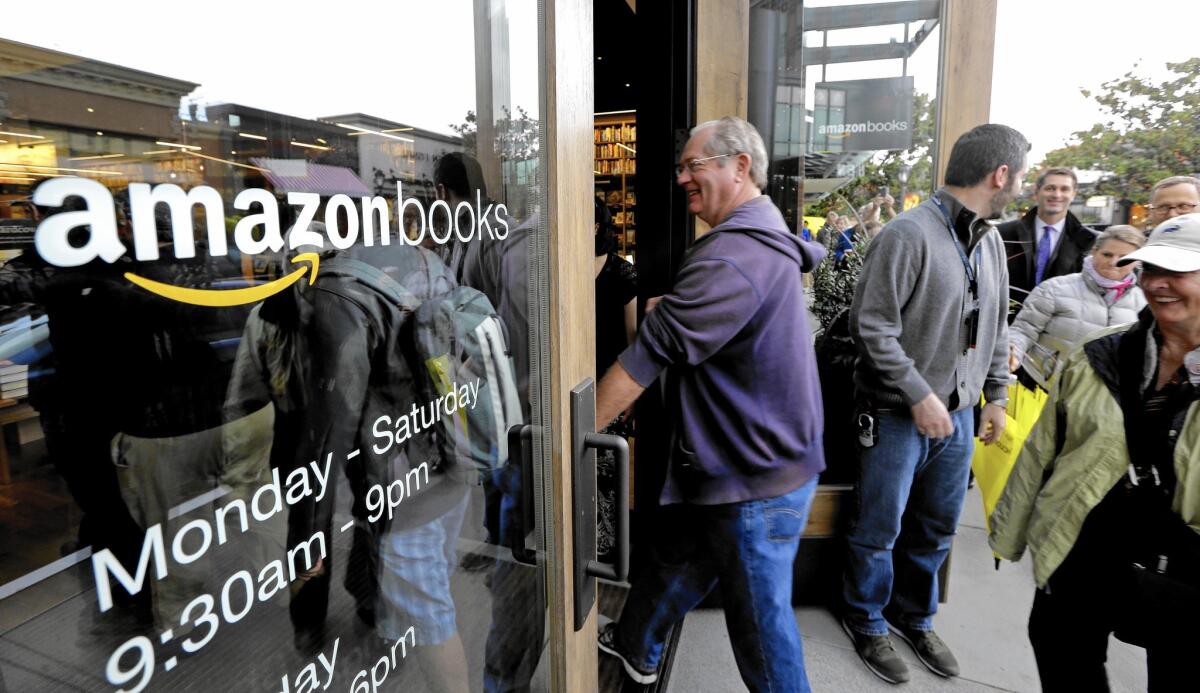Amazon’s bookstore buzz hits San Diego

Amazon is coming to town. But instead of catering to couch potatoes, the company is targeting people who prefer to browse or shop in actual stores.
The Seattle-based e-commerce giant is hiring store managers, booksellers and gadget enthusiasts for an Amazon Books retail store in the “La Jolla or San Diego area,” according to multiple job listings posted online this month.
The job posts signal Amazon.com Inc.’s growing interest in the offline world, thus far a mostly untouched region for the company where it can extend its customer service prowess to face-to-face encounters, create shelf space for its growing lineup of hardware products and more efficiently handle returns.
To date, Amazon has publicly announced only one brick-and-mortar bookstore, a Seattle location spanning 7,500 square feet, with approximately 5,500 square feet of retail space. It opened in November at University Village, an upscale outdoor mall.
The singular bookstore, which sells a limited selection of the site’s most popular and best-reviewed titles, doubles as a showroom for Amazon gadgets, including its Kindle, Fire TV, Fire tablets and Echo.
The company’s broader brick-and-mortar ambitions became a topic of debate this month after Sandeep Mathrani, chief executive of General Growth Properties Inc., said in a conference call with investors that Amazon’s goal is to open between 300 and 400 bookstores. General Growth Properties owns, leases and manages various retail locations across the U.S., but Mathrani is not directly affiliated with Amazon. After the comments garnered widespread attention, he backpedaled.
John Mutter, editor in chief of industry trade publication Shelf Awareness, believes Amazon is more likely targeting about a dozen physical locations to open in the next year or two.
Amazon’s exact plans for San Diego are unknown, and the company, when reached for comment, declined to discuss its intentions for the area. The local job postings, however, suggest that it is already in the staffing stages for at least one store in the region.
SIGN UP for the free California Inc. business newsletter >>
In an email exchange, Reg Kobzi, senior vice president for commercial real estate brokerage CBRE, indicated that Amazon had been looking for retail space, but he would not comment further, citing a confidentiality agreement.
Should the e-commerce juggernaut open up shop in Southern California, customers can expect an unusual twist on the book-buying experience. Titles, chosen based on online appeal, are all displayed face out, emphasizing cover appeal instead of maximizing selection. That means familiar books in many genres may not make the shelves. This isn’t the store for aficionados of fine literature. And in a seeming nod to Apple Inc.’s retail strategy, Amazon’s Seattle bookstore displays its name-brand gadgets front and center for shoppers to pick up and play with.
“For the amount of space Amazon has, [the Seattle store’s book selection] felt kind of skimpy,” said Mutter. “Any other bookstore of that size would have five to 10 times the number of books.”
Meanwhile, independent bookstores are enjoying something of a resurgence after years of decline. Over the last six years, the number of bookstores has grown each year, surpassing 2,200 in 2015. That’s up from just 1,400 in 2009, based on membership numbers provided by the American Booksellers Assn.
Equally heartening, the group says, is the 10% increase in sales reported last year by independent book sellers.
That growth doesn’t make up for the costly effect that Amazon’s expansion has had on small business and jobs, concludes a report released last month by the booksellers group. The report found that the shift to online sales has led to a decrease in demand for retail space of more than 100 million square feet, the equivalent of 30,000 traditional storefronts employing 136,000 workers.
Mutter of Shelf Awareness attributes the recent resurgence of independent bookstores, in part, to their efforts around emphasizing in-store perks, such as author events, that Amazon hasn’t been able to copy. Its bricks-and-mortar business plans, then, are sure to make it even less popular with this group.
“In the book world, Amazon is an evil empire,” Mutter said.
Powell’s Books, a Portland, Ore.-based chain with five locations, is not overly concerned.
“We did check out the store in Seattle, and found their model not very compelling to us,” said co-founder Michael Powell, whose 70,000-square-foot flagship store has an inventory of a million volumes.
“I’m not in any panic mode,” he said. “We’ve survived Barnes and Noble, I think we can survive Amazon.”
ALSO
Scholastic to publish new Harry Potter book
Amazon’s stock dives, but it’s because of a ‘good problem’
A floating library and artist record store: 9 must-see booths and events at the L.A. Art Book Fair
More to Read
Inside the business of entertainment
The Wide Shot brings you news, analysis and insights on everything from streaming wars to production — and what it all means for the future.
You may occasionally receive promotional content from the Los Angeles Times.








